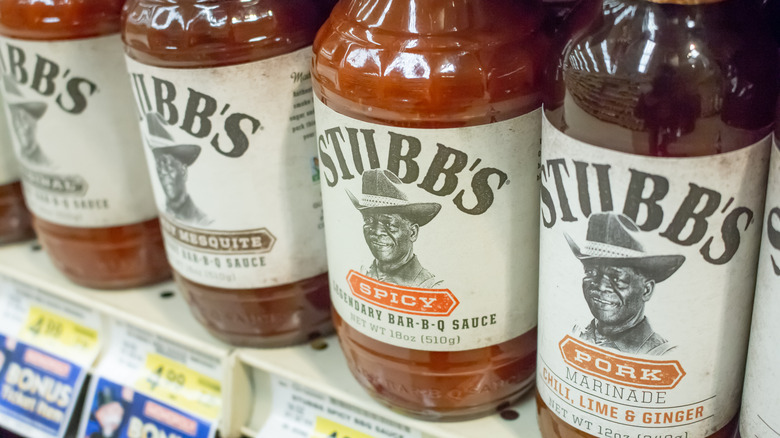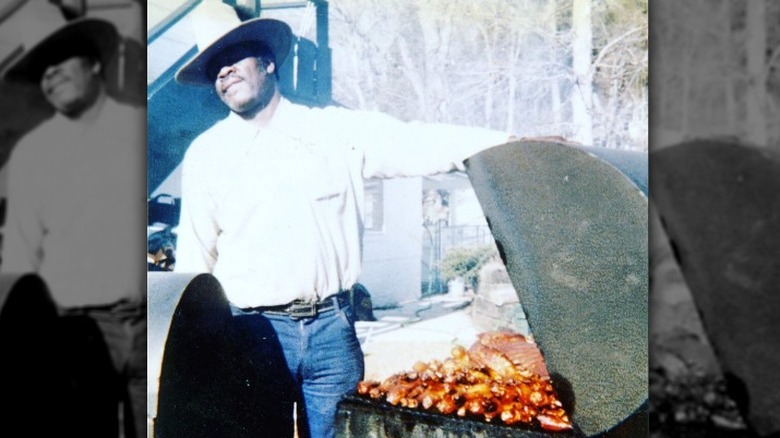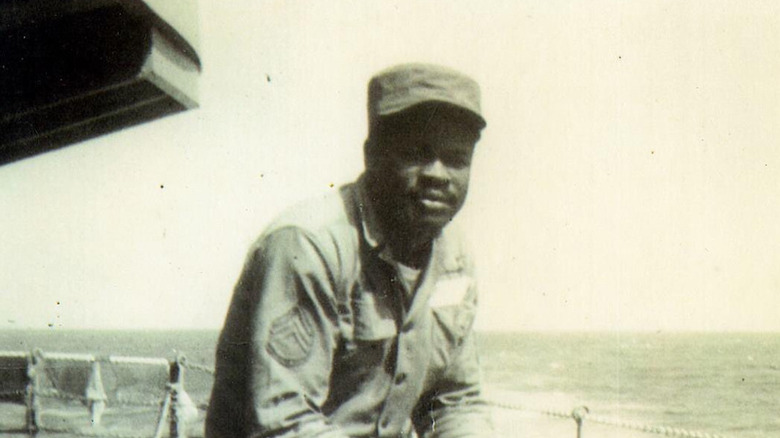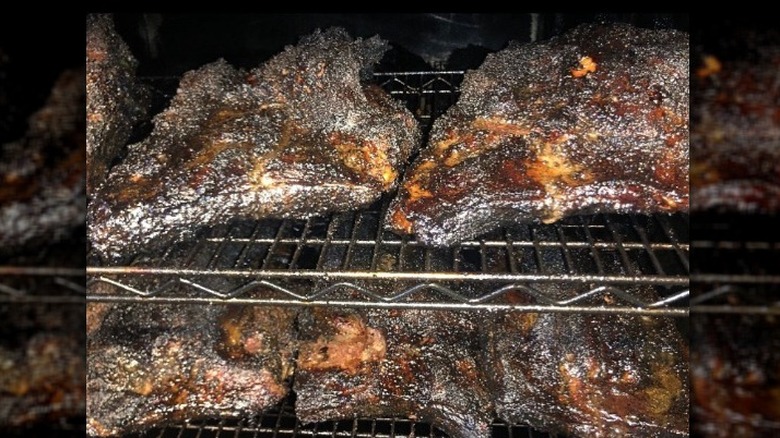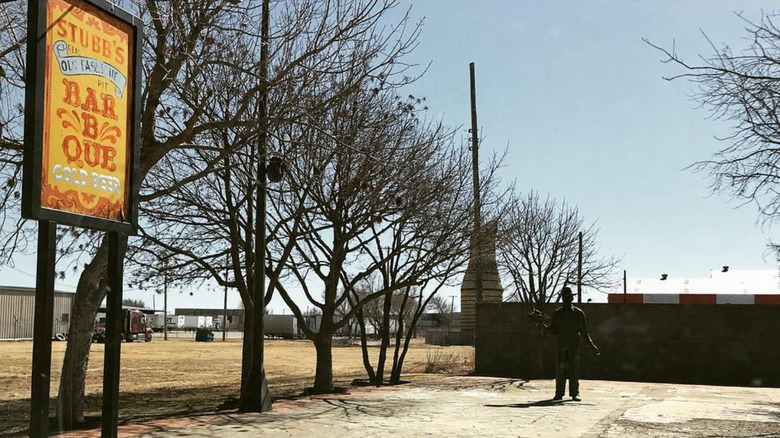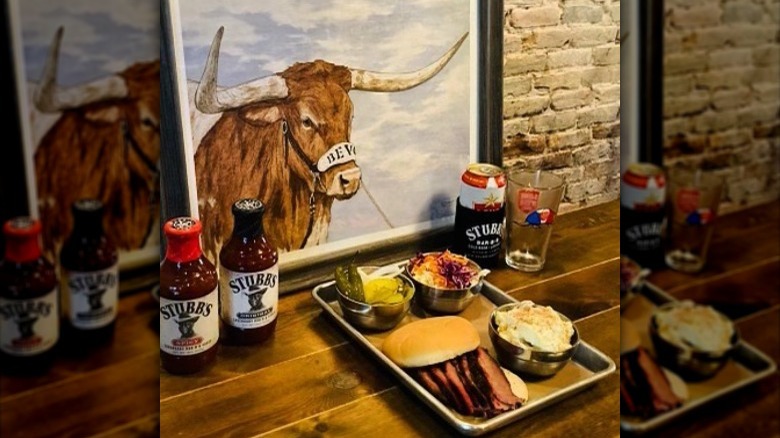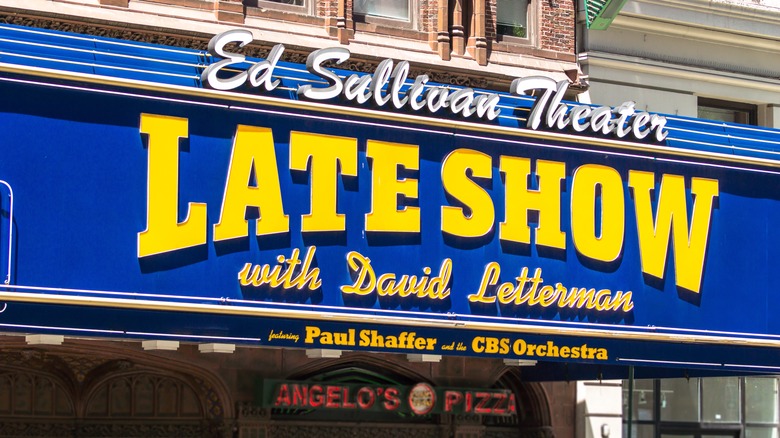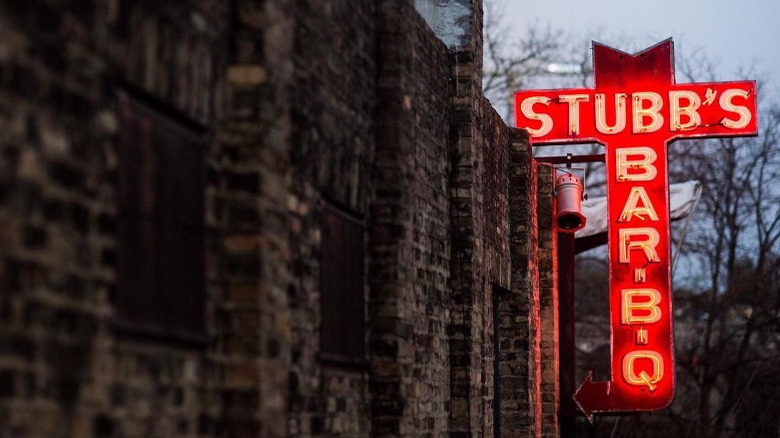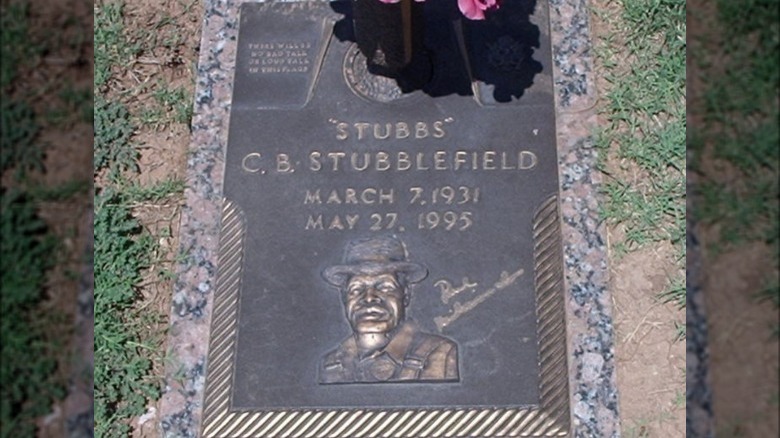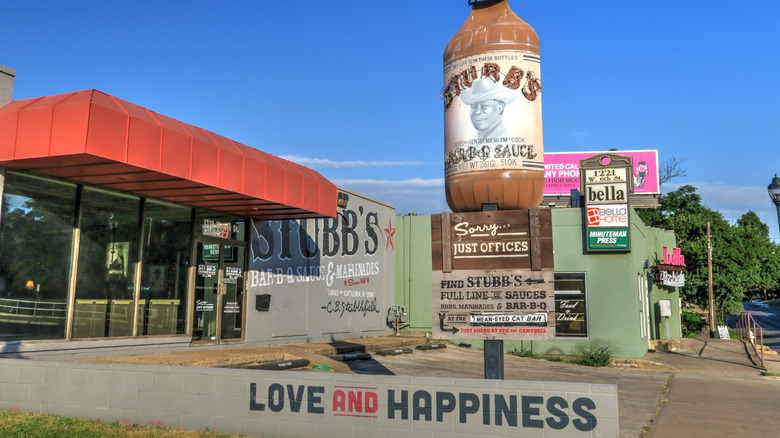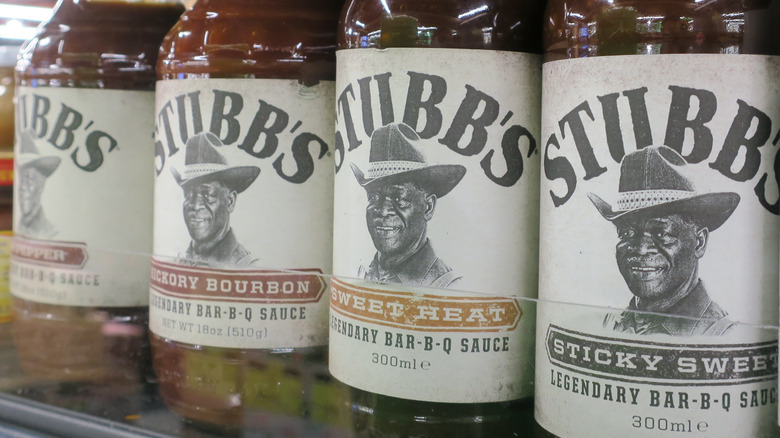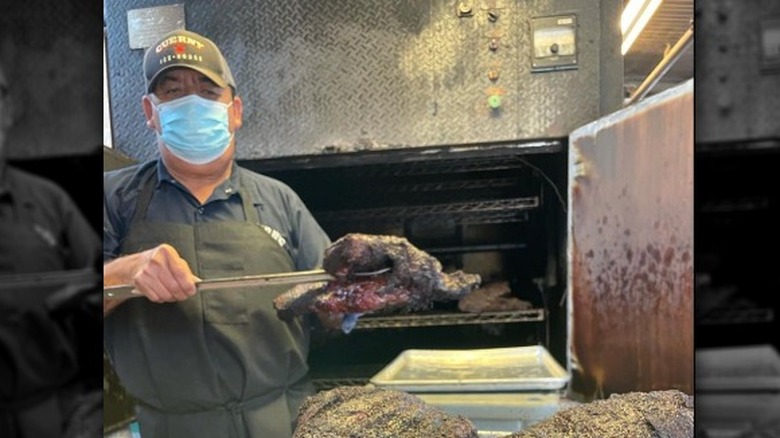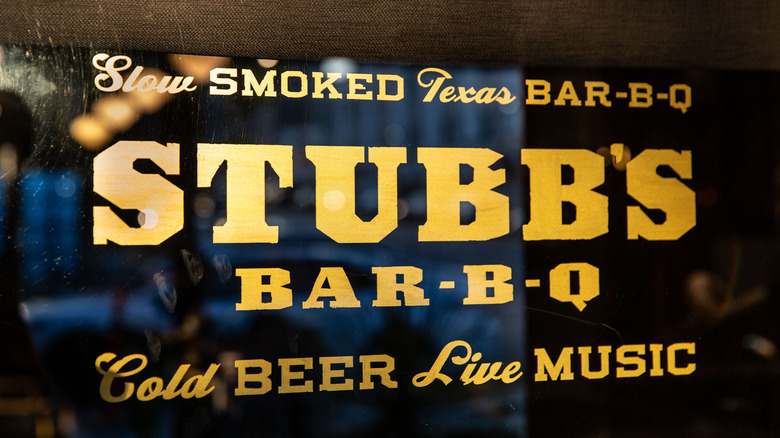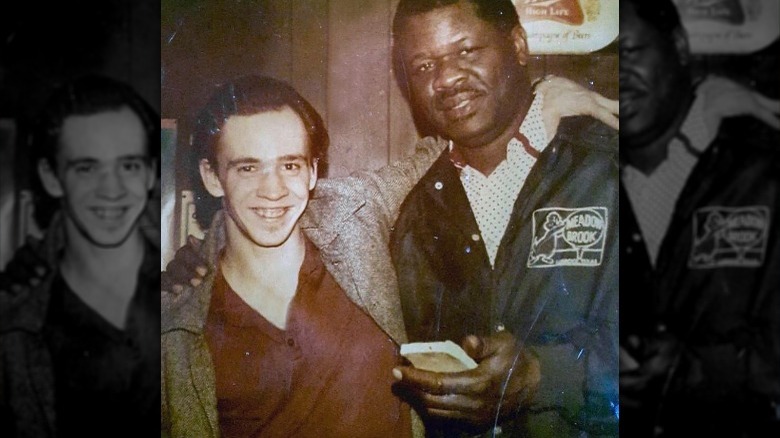Everything You Need To Know About Stubb's Barbecue Sauce
America has a strong taste for barbecue sauce. Ibis World has projected the 2023 U.S. market alone to be $1.9 billion — maybe not the same as the $5.81 billion U.S. ketchup market that Statista reports, but certainly a lot of barbecue sauce bottles nonetheless. In recent years, Stubb's has been one of the major players in the sauce world. As of 2014, Statista ranked Stubb's as the sixth best-selling barbecue sauce. And in 2015, grilling industry giant McCormick & Co. Inc. acquired the brand by purchasing One World Foods Inc. outright for $100 million (via The Baltimore Sun).
Not only is it popular, but Stubb's is widely considered a premium sauce. Food52 gave them the No. 2 and No. 3 spots in their 2022 listing of the best barbecue sauce brands — for their Smokey Mesquite and Smokey Brown Sugar varieties, respectfully — and CNET ranked the original sauce No. 2 on their 2023 list. Stubb's was also reformulated as gluten-free in 2010 so more people can experience it (via Cision PR Newswire). But the story behind this sauce and the man who created it may be even more fascinating than the sauce itself. Here are the things you should know about Stubb's barbecue sauce and why its Texas flavor is so beloved.
Stubb was a real guy
Many companies create fictional people and stories around which to build a brand — as PBS reminds us, Betty Crocker was born from an advertising campaign. But in the case of Stubb's, no fiction was necessary. "Stubb" and "Stubbs" were the nicknames of Christopher B. Stubblefield, who was born on March 7, 1931, in Navasota, Texas (via Texas State Historical Association). The Austin American-Statesman says Stubb was one of 13 kids, while McCormick says he was one of 12 kids. Either way, that's a lot of siblings to grow up with.
Stubb didn't stay in Navasota long, though. Stubb's father, a Baptist preacher, moved the family to Lubbock sometime during the 1930s. There, the Stubblefield family made a living picking cotton, with Stubb also doing some work at restaurants and hotels as he eventually grew to a towering 6 feet 5 inches in height. Stubb also married at age 16, eventually having three children. He went by many other names, too, with his grandson telling McCormick that people also called him C.B. and grandkids called him Peepaw. And incidentally, the "B" didn't stand for anything — it was his full middle name.
His cooking first became well-known in the Army
So how did Stubb go from picking cotton to having a nationally known barbecue sauce? It all began when he left Lubbock to join the U.S. Army. Although the exact date he enlisted is unknown, Stubb's Austin recalls that C.B. was a staff sergeant and gunner in the Korean War. Stubb served in the 96th Field Artillery battalion, which reportedly was the final all-Black American regiment.
However, as the Lubbock Cultural Arts Foundation later wrote, he suffered multiple injuries in combat. This inadvertently paved the way for Stubb's post-Army career — because of the injuries, he was reassigned as a mess sergeant. Stubb already loved cooking, and in the mess hall, he prepared meals for up to 10,000 soldiers every day until receiving an honorable discharge in 1967. He came back to Lubbock with two Purple Hearts and an even deeper knowledge of cooking. American Royal went so far as to say the Army mess hall was Stubb's "real" first restaurant.
He opened his first official restaurant in 1968
One year after returning from the Army, Stubb turned his cooking skills into a business venture. Stubb's Bar-B-Q opened in 1968 in his adopted hometown of Lubbock (via Texas State Historical Association). A Caprock Sun article archived on Virtualubbock recounts the original venue could only fit 75 people. Nevertheless, Stubb filled it with recipes featuring his homemade barbecue sauce, a blues music jukebox, and signs that unequivocally declared, "There Will Be No Bad Talk or Loud Talk in this Place."
Soon, the restaurant grew into something more. In 1973, Stubb gave hitchhiking guitarist and fellow Lubbock resident Jesse Taylor a ride. They quickly became friends, and Taylor eventually convinced Stubb to let him build a music stage in his barbeque joint. The Sunday blues jam sessions that followed soon became as well-known as the food — and many of those who played went on to international fame. Musicians such as Joe Ely, Stevie Ray Vaughan, Muddy Waters, George Thorogood, Linda Ronstadt, and Johnny Cash played at Stubb's — all of them for tips and food. Recognizing his influence on local music, the Buddy Holly Center of Lubbock hosted a "Sunday Night Jam" gallery in 2022 and 2023, featuring authentic Stubb's restaurant artifacts.
His restaurant(s) ultimately failed
Despite its popularity, Stubb's Lubbock venture wasn't meant to last. As Texas Monthly put it: "Stubblefield was a great cook and amiable host ... but he wasn't a great businessman." Jimmy Dale Gilmore was more blunt, telling The Kitchen Sisters podcast that Stubb had "zero business sense" (via NPR). Fellow musician friend Tom T. Hall added that his friends created their own version of the IRS, called "Idiots Rescuing Stubb," that would periodically raise money to keep the restaurant going.
They couldn't keep Stubb in business forever, though. In either 1984 or 1985 (sources vary), Stubb ran into troubles with the real IRS that forced him to shut down. Stubb later told Texas Monthly that he was run out of town, lamenting, "I can't fight the IRS with barbecue and sauce" (via McCormick)
Instead of calling it a day, Stubb simply headed down the Texas road to Austin (via Texas State Historical Association). At first, he cooked for an existing blues club called Antone's. Then in 1986, he opened a new Stubb's Barb-B-Q location along Interstate 35. But that location had an even shorter lifespan than the Lubbock original, closing its doors in 1989 and leaving Stubb wondering what to do next.
He began selling bottled sauce after his second restaurant closed
The closing of his Austin restaurant wasn't the only tragedy that befell Stubb in 1989 — Texas Monthly recalls he also had a heart attack, and the combination nearly rendered him unhoused. But in a great irony, that one-two blow led to Stubb's barbecue sauce getting on grocery store shelves. Stubb's friends convinced him to bottle his barbecue sauce as a source of income. Singer-songwriter Kimmie Rhodes and Sharon Ely — the wife of country singer Joe Ely — even told him they'd buy it as gifts for others. Another trio of friends took it upon themselves to find investors and send Stubb regular checks to pay the bills.
So Stubb went to work. American Royal writes that Stubb would hand-bottle sauce in old jam jars and whiskey bottles whiles using jalapeño peppers as corks. Another Texas Monthly article notes that, in the early years, each jar and bottle came with an audiobook narrated by Stubb called "Stubb's Blues Cookbook Cassette." You can read a full transcription of the book at Virtualubbock, which includes how to choose a barbecue pit, select the right wood, and the process for cooking various meats and sides — it's basically a barbecue manual on tape.
Stubb got his big break on Letterman
Despite the love and care put into each bottle, and the business getting incorporated as Stubb's Legendary Kitchen in 1991, business was mighty slow at first (via Texas Monthly). That year, they only did $8,000 in sales, and costs were extremely high — in part because Stubb was buying ingredients at retail prices. But early in the year, Stubb got the break he needed. When his friend Joe Ely performed on Late Night with David Letterman, he brought a bottle of Stubb's barbecue sauce with him (via McCormick). Letterman was so intrigued he invited Stubb to come on the show that summer.
Stubb didn't know who Letterman was at the time, so after accepting the invite, he watched the show for three straight weeks to learn about the host. He later gave Ely a blunt assessment of Letterman: "Not a very nice man." But when showtime arrived, Stubb turned on the charm, spending six minutes cooking for the staff and audience while relegating Letterman to a straight-man role. And when Letterman asked Stubb what good barbecue requires, he answered, "love and happiness."
Stubb's barbecue sauce sales soon exploded
Buoyed in part by his Letterman appearance, Stubb's sauces became available at regional stores in 1992 (via Austin American-Statesman). However, it would take more than TV notoriety for the sauce to be a lasting success. At the time, Stubb was still making every batch himself by hand in a 60-gallon cooker and stirring it with a paddleboat oar, limiting what could be produced.
But Texas Monthly says it was also around this time that Stubb's Legendary Kitchen made some business changes. Later that year, Stubb moved production to a larger plant in Dallas, and he also started buying ingredients wholesale to lower costs. McCormick adds that Stubbs worked with people who could do small-batch production of his recipes on a large scale. Meanwhile, Eddie Patterson and Scott Jensen became full-time salespeople. And after initial failed attempts to sell directly to grocery chains, they heeded a recommendation to work with distributors to boost sales.
The moves paid off fast. In 1992, total sales jumped to $100,000 — a 1,150% boost. By 1994, sales had reached $700,000, and the company introduced chicken and pork marinades to join his Original and Spicy barbecue sauce flavors. All the while, C.B. was hitting the tradeshow circuit to spread the word of Stubb's.
Stubb passed right as his business was rising
Sadly, the end was in sight for the man who created the now-famous sauces. On May 27, 1995, Stubb passed away in his sleep at age 64 (via Texas State Historical Association), with the official cause of death being congestive heart failure. Heart problems had bothered Stubb dating back to his 1989 heart attack — according to The Caprock Sun, he once remarked, "My spark plugs ain't firing, and I got this tornado loose in my chest" (via Virtualubbock). As a result, he never got to enjoy the full fruits of the success he had spent decades laying the groundwork for.
Stubb's funeral and burial were held in Lubbock with standing-room-only attendance. The Caprock Sun noted it may well have been the most diverse crowd ever in Lubbock. Coincidentally — and perhaps eerily — right around the time Stubb died, his business partners had closed on a historic building in Austin with plans to build a new restaurant. The Texas State Historical Association says it was the day Stubb passed, while Texas Monthly says it was just before his death. Regardless, it was a blow to his business partners and friends. But following talks, they decided to continue with their plans with a guiding question for each decision: What Would Stubb Do?
Growth continued almost non-stop
Even with Stubb gone, the appetite for his sauces continued to soar. In 1996, the year after his death, the new Stubb's Austin location that he had helped plan opened its doors (via McCormick). Two years later, his sauces and marinades brought love and happiness to England for the first time. By 1999, Texas Monthly reported annual sales for Stubb's Legendary Kitchen had surpassed $7 million — an 87,400% increase over their 1991 numbers.
That same year, Stubb's merged with Timpone's, a fellow Austin company that specialized in organic pasta, sauces, and salsa. Joining forces helped them reach even more markets. In 2012, their CEO disclosed to the Austin American-Statesman that annual sales were approximately $20 million, and the parent company had changed its name to One World Foods. By the time McCormick & Co. paid $100 million in 2015 to purchase the company in full, projected yearly sales were up $30 million (via The Street).
Stubb's now has an extensive product line
Today, you can enjoy Stubb's barbecue products almost any way you want. McCormick now lists nearly a dozen Stubb's Bar-B-Q sauces. In addition to the Original and Spicy varieties, you can get Hickory Bourbon, Sticky Sweet, Simply Sweet Reduced Sugar, and even sauce made with Dr. Pepper. In addition, they have wet marinades, marinade mixes, "Anytime Sauces," wing sauce, basting sauce, liquid smoke, and dry rubs, giving you many ways to cook with Stubb's.
Want Stubb's mixed into your favorite snack foods? Say no more. Herr's is currently licensed to make barbecue potato chips and cheese curls with Stubb's sauces. You also can get Bigs Stubb's Tangy Bar-B-Q Sunflower Seeds, putting barbecue heaven at your fingertips even when the pit isn't fired up.
If you're looking for ways to use Stubb's sauce for your next cookout, you're in luck. The Get Inspired section on the McCormick website has dozens of recipes and tips — some of which come directly from Stubb's grandson Rocky Stubblefield. You'll also find stories about the man whose recipes led to this burgeoning barbecue empire.
Stubb is in multiple halls of fame
Although Stubb is no longer with us, his influence is still recognized. In 2019, C.B. Stubblefield was inducted into the American Royal Barbecue Hall of Fame (via KVUE ABC). Reportedly, Stubb was the first person from Central Texas to be inducted. Through 2022, he is one of only 48 Hall of Fame members (via American Royal).
It was the latest in many posthumous accolades — particularly for nurturing music. The Texas State Historical Association notes that in 1996, he was one of the inaugural inductees into the Buddy Holly Terrace of Lubbock for contributing to the local arts. Three years later, the Lubbock Arts Alliance dedicated a life-size statue. Standing at the location of the original restaurant — though the building is no longer there — the Lubbock Avalanche-Journal notes it has a plaque matching the building signs that read, "There Will Be No Bad Talk or Loud Talk in this Place."
The Lubbock Cultural Arts Foundation adds that Stubb is also part of the West Texas Walk of Fame. And interestingly, it's not just Lubbock that claims Stubb. In 2009, Stubb was also inducted into the Austin Music Memorial for his role in that music scene.
The Stubb's restaurant is now an Austin landmark
A new Stubb's restaurant opened in Austin in 1996, and suffice it to say that Stubb's Austin has come a long way from the original Lubbock barbecue joint. Per the Austin American-Statesman, the highlight of the present-day Stubb's Bar-B-Q is an outdoor amphitheater that seats 2,500 people and has hosted artists such as the Foo Fighters, Lady Gaga, and Black Pumas. There is also a 200-300 seat indoor space in the basement, and they host a gospel brunch every Sunday.
The commitment to great barbecue has remained in the family, too. Everything Lubbock details that even after McCormick acquired the sauce brand, grandsons Rocky and Reggie have stayed on as brand ambassadors. In 2022, Stubb's Austin joined the sauce in going big-time when C3 Presents and Live Nation acquired full ownership of the venue. It wasn't a complete break from the past, though. Charles Attal, a co-owner of C3 Presents, was also an original partner in the Austin restaurant, ensuring a continued connection to Stubb.
But new locations had to change their name
It's only logical the success of Stubb's Austin would lead to ownership wanting more locations. But expansion hopes soon led to a legal kerfuffle. The Austin Business Journal reported that on November 25, 2015 — shortly after McCormick & Co. agreed to acquire One World Foods, the maker of the bottled barbecue sauce — they sued Stubb's Austin Restaurant Co.
The trademark suit concerned plans to offer the restaurant's food at a grocery store and a dive bar in the Austin area. According to McCormick, the restaurant company only had the rights to do so at the main restaurant and an existing dive bar they owned. As the staff writer succinctly put it, "Call it Stubb's vs. Stubb's."
After extended negotiations, Community Impact reported a settlement in July 2017 where the restaurant would change its name. The trio of secondary outlets got new monikers in late 2018, with Eater Austin reporting they were now called Do-Rite Barbecue. There was a happy ending for the main location, though, as news broke in late 2019 that McCormick would let them keep the Stubb's name (via Austin American-Statesman). Not only that, but the restaurant is now featured on the McCormick website.
Stubb's legacy lives on through it all
The mutual partnership between the sauce maker and the restaurant would be just fine with Christopher B. Stubblefield. As grandson Rocky told KVUE ABC, Stubb was all about humility and love. The Caprock Sun (via Virtualubbock) reported that his warmth was just as important as his cooking prowess. One of his favorite things to say was, "Ladies and gentlemen, I'm a cook" — a phrase that was later trademarked for selling his sauce (via Trademarkia).
And for Stubb, color didn't matter when it came to friendship and good food. According to NPR, Stubb's Bar-B-Q was one of the few desegrated places in Lubbock during the '60s and '70s, breaking down barriers through food and music. Terry Allen added that Stubb's was where many Black and white people ate, enjoyed music, or played music together for the first time. Countless stories have been told about the man's generosity and love, and the image of Stubb on every bottle of his sauce honors that legacy.
